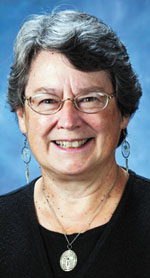By Corinne Winter
June 28 is the feast of St. Irenaeus who was Bishop of Lyons at the end of the second century, CE. Robert Ellsberg, who writes daily reflections on the inspiring lives of holy people, calls Irenaeus “one of the first systematic theologians.” Irenaeus wrote at length on the truth of the Christian faith, especially in response to various forms of dualistic thinking that were prevalent during his time.

Dualism is the practice of making false divisions. Second-century dualists (often called Gnostics) for example, divided matter, which they viewed as evil; from spirit, which they considered good. They went so far as denying that One God was creator of all, insisting, rather, that matter was created by a lesser or an evil god, while spiritual reality alone was the creation of the Good God. They also denied the full humanity of Jesus because they could not conceive of a divine savior coming into actual contact with the material side of humanity or with the material world in general. They made false divisions among groups of people as well, thinking they could identify some people as spiritual and therefore righteous or saved, and other people as materially oriented and therefore unrighteous or unsaved. The categories were based on peoples’ known occupations or concerns. Irenaeus was quick to point out that in presuming to judge others, they were usurping a right that belongs to God alone.
The ideas condemned by Irenaeus are ancient history, right? Those dualistic tendencies have surely been wiped out? Well, we no longer consider creation by two opposing gods or overtly deny the true humanity of Jesus. And we have, if anything, become too convinced of the goodness of material things. But are we not tempted to make other false divisions? Are there not new forms of dualistic thinking that we, as Christians, are called to resist?
Do we not experience the temptation to categorize people based on incomplete knowledge of who they are? Do we not attach labels or identify certain religious or political convictions in ways that dismiss people as not worthy of our attention? Can we not be quick to judge others on the basis of one action or even on appearance or family connections?
It seems to me that we are also tempted today to make false divisions between our life of faith and the rest of our lives. Even when we agree that our Catholicism can’t be limited to an hour a week, do we deem our obligations to go beyond personal prayer, reception of the sacraments, intellectual assent to the teachings of the church and perhaps certain acts of “charity?” When members of the Magisterium speak to issues of economic or environmental justice, of international relations, immigration or treatment of criminals, how often do we hear that they should “stay out of politics?”
Irenaeus is often quoted as having said, “The glory of God is the human person fully alive.” He exhorted Christians of his time that to be truly spiritual meant to integrate all aspects of one’s life and to direct them according to one’s professed values and beliefs. Today’s world cries out again for that kind of integrity and fullness of humanity. It calls for us to eschew all false divisions and to be fully involved as people of faith in all that concerns our life together.
Leaders of our church continue to call us to that involvement. Our bishops ask us to speak out and to work for just treatment of immigrants and refugees and to defend the right to life for all. Pope Francis joins his predecessors in asking us to care for the earth, to recognize and oppose violations of human rights and of our environment, to insist on economic justice among individuals and nations. They ask us to recognize our inherent connection with all people and to enter into dialogue even when it seems no agreement could be possible so as to avoid violence in our responses to one another.
We can take Irenaeus, among many other theologians of our Tradition, as patrons in our continuing efforts to live a fully human, fully Christian life.
(Corinne Winter is a professor-emeritus of St. Ambrose University, Davenport.)











